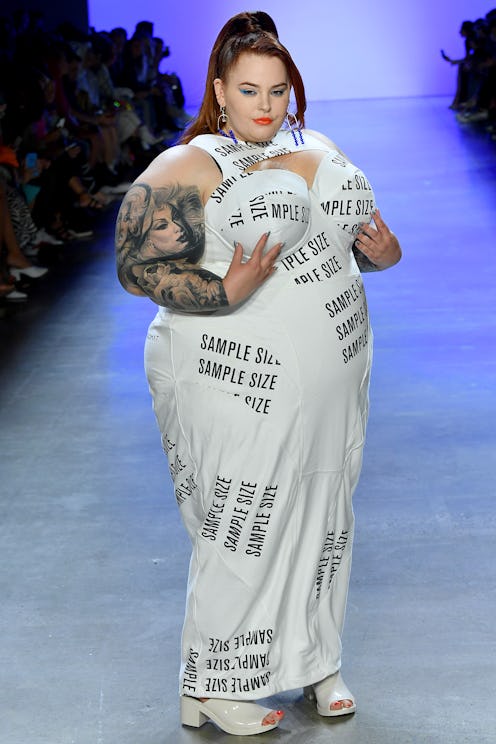Fashion
Don’t Like the Term “Plus-Size”? Here Are Some Positive Alternatives
Plus-size is not a dirty word, but there are plenty of other options.

Curvy, big-boned, fat, thick, plump, full-figured — plus-size girlies have a whole thesaurus of alternative words for describing the same thing: our bodies. This fact in itself is ironic as hell. Why do we need a separate descriptor for a body that just...isn’t thin?
Thinness is the standard of beauty and represented in 98% of the images we see in media, according to a 2016 study conducted by the Social Context Lab and Refinery29. The same study showed that an overwhelming majority of women in the United States are actually plus-size, at 68%.
Additionally, many activists have reclaimed the term “fat,” noting that it is just another descriptor in the same way that words like thin, tall, and short describe someone’s physical appearance. The National Association to Advance Fat Acceptance (NAAFA) is one organization fighting to normalize the term and end size discrimination — which is illegal in just one state and six cities in the United States.
Aubrey Gordon, the voice behind Your Fat Friend, covered this issue in a 2021 SELF piece, stating: “Not everyone is comfortable being called fat. But that discomfort can’t override fat people’s body autonomy. And that means that all of us — fat or thin — are going to need to get comfortable enough to hear someone else say the word fat without objecting (unless it’s used in an abusive way, of course).”
On the other hand, some models and celebrities, including Ashley Graham, have expressed their disdain for the term “plus size.” “I think the word ‘plus-size’ is so divisive to women,” Graham told CBS Sunday Morning in 2017, adding that it puts women in a category, effectively labeling them with “You don’t eat well. You don’t work out. You could care less about your body. You’re insecure. You have no confidence.” This, she explained, is not the case for many.
The term plus-size, however, is necessary as long as a disparity remains between what retailers offer to customers who wear above and below a size 12. Currently, less than 20% of the fashion industry produces plus-size clothing, according to retail research and advisory group Coresight Research, and that number drops to a whopping 0.1% (yes, less than a whole percentage) for the luxury market.
I, for instance, can’t shop for clothes without specifying that I’m shopping for plus sizes. Whether online or in-person, I need to make that distinction in order to find the size I need. Every. Single. Time. And when I’m shopping in person, I also have to ask salespeople if their store carries plus sizes — and where they’re located, because it’s never obvious. Nine times out of ten, if a store does carry plus, I’ve found that the section is housed in a dark, dusty corner hidden in the back. Out of sight, out of mind.
While it would be great not to have to constantly slap a label on my body — especially because straight sizes aren’t labeled to show their ‘other-ness,’ as they’re considered the default — plus-size shoppers will have to keep using the term until the industry becomes equitable and accessible for everyone.
Nothing’s inherently wrong with the phrase plus-size (or fat, for that matter), but you should always defer to the preferred terms of the person you’re describing — no matter what their size. That said, if you prefer a label that isn’t tied to the exclusionary aspect of the fashion industry, here are some alternatives.
Positive Words That Mean Plus-Size
- Curvy: use sparingly and at the discretion of the plus-size person. Sometimes this can come off as objectifying or unnecessarily PC.
- Voluptuous: this term is deemed a bit more sensual, so again, use at the discretion of the person.
- Full-figured: this can describe someone who has a rounder body shape and could be considered more polite if the person is uncomfortable with the term plus-size.
- Extended size: used by retailers to refer to plus-size clothing; however, similar to plus-size, it wrongly implies that straight sizes are the default.
My Personal Favorite Terms
- Thick/Thicc/Thick’ems: a product of AAVE — African American Vernacular English.
- Big belly gyal: exclusive to baddies from the West Indies and their diasporic fam.
Offensive Terms To Retire
- Big boned: a fat person’s bones aren’t necessarily bigger, we just have more fat — and that’s fine.
- Obese: obesity is measured based on body mass index but doesn’t account for aspects like genetic predispositions, muscle mass, and health conditions, and is not an accurate measurement of health.
- Overweight: also measured based on BMI; it also implies there’s a universal “normal” weight, when weight is personal and individual.
Phrases That Represent The Fat Spectrum
- Small fat: wearers typically fall between sizes 14-18 or 1X-2X and can access most retailers that offer plus-sizes — and sometimes straight-size retailers as well.
- Mid-fat: between a size 20-24 or 2X-3X — some retailers that have expanded their size range will “go up to” roughly this size, and these wearers almost exclusively shop plus sizes.
- Super fat: size 26-32 or 4X-5X — very few brick-and-mortars carry this size range, and people who wear this size must exclusively shop plus-size.
- Infinifat: above a size 32 or 6X — the most underserved of sizes. These clothes usually have to be custom ordered.